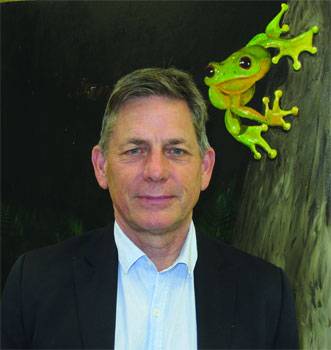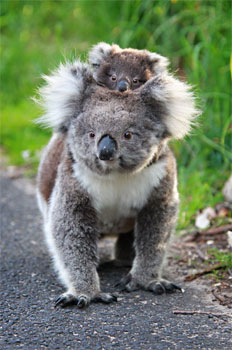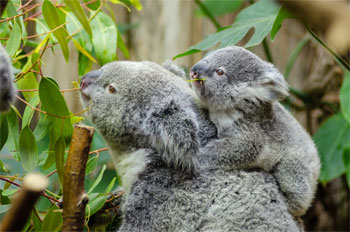Ian Darbyshire Foundation for National Parks and Wildlife Interview

One Of Australia's Most Iconic Animals Is Threatened, With Numbers Already Dropping By 80%
Once widespread across Australia, koala numbers have declined over the last twenty years with some populations dropping by 80%. In NSW, QLD and ACT they are now declared as a 'vulnerable' species as they continue to suffer serious decline nationwide. The koala population on the Koala Coast (east coast QLD) has had an estimated 80% drop between 1996 and 2014 - resulting in fewer than 40,000 koalas left in the wild.
In the last 100 years approximately 80% of Australia's eucalypt forests have been destroyed. As Eucalyptus trees are the only source of food for koalas, this is causing serious repercussions. This, along with the effects of drought, is causing koala numbers to dwindle.
Koalas are also facing the growing threat of climate change, diseases, domestic dog attacks, bushfires and road accidents. In the period of 1997 to early 2011, an average of almost 300 koalas were killed each year by motor vehicles in south east QLD. To combat the continuing decline of Koalas, the Foundation for National Parks & Wildlife (FNPW) have been committed to funding and supporting koala conservation projects for many years. Ian Darbyshire, CEO of FNPW, acknowledges the decline stating that "this is an iconic Australian animal that needs our help right now."
"We have been involved in many different initiatives to preserve the habitat and survival of this beautiful species. The Koala Community Planting initiative is just one of the many projects that encourage communities and locals to lend a helping hand towards koala conservation. The initiative involved planting 5000 native plant species to extend the habitat of vulnerable koala populations. Another project, The Plant a Tree for Me initiative ran for four months across three parklands with 140 volunteers planting over 3,200 seedlings including 300 koala food source trees. These community grown plants have allowed koalas to safely travel, feed, find mates, and raise their young," says Ian.
 FNPW have also been involved in another project that focuses on inoculants research. The project was created after discovering one third of koalas died within 12 months of relocation. The project found that inoculants aim to provide koalas with gut microbes needed to digest different chemicals found in eucalyptus in the new habitat areas. Koalas now have a larger chance of survival once being translocated because of the newly discovered research.
FNPW have also been involved in another project that focuses on inoculants research. The project was created after discovering one third of koalas died within 12 months of relocation. The project found that inoculants aim to provide koalas with gut microbes needed to digest different chemicals found in eucalyptus in the new habitat areas. Koalas now have a larger chance of survival once being translocated because of the newly discovered research.
FNPW are also working with various councils who have developed their own Koala Management plans. FNPW continues to fund more programs that assist in protecting the koala population and identifying koala threats. These include:
The impact of bushfires on koalas
Research on the movement of koalas back into severely burnt forest
Koala tree choice research
Southern Highlands Koala satellite tracking and conservation
The Great Koala Count
Koala Habitat Rescue
"Australia has amazing wildlife that cannot be seen anywhere else in the world, one of which is the koala. We need to make sure that these species are protected so that they can be enjoyed by future generations. With the community's support, FNPW will continue to fund projects that make sure these species thrive and grow," says Ian.
For more information visit www.fnpw.org.au.
In the last 100 years approximately 80% of Australia's eucalypt forests have been destroyed. As Eucalyptus trees are the only source of food for koalas, this is causing serious repercussions. This, along with the effects of drought, is causing koala numbers to dwindle.
Koalas are also facing the growing threat of climate change, diseases, domestic dog attacks, bushfires and road accidents. In the period of 1997 to early 2011, an average of almost 300 koalas were killed each year by motor vehicles in south east QLD. To combat the continuing decline of Koalas, the Foundation for National Parks & Wildlife (FNPW) have been committed to funding and supporting koala conservation projects for many years. Ian Darbyshire, CEO of FNPW, acknowledges the decline stating that "this is an iconic Australian animal that needs our help right now."
"We have been involved in many different initiatives to preserve the habitat and survival of this beautiful species. The Koala Community Planting initiative is just one of the many projects that encourage communities and locals to lend a helping hand towards koala conservation. The initiative involved planting 5000 native plant species to extend the habitat of vulnerable koala populations. Another project, The Plant a Tree for Me initiative ran for four months across three parklands with 140 volunteers planting over 3,200 seedlings including 300 koala food source trees. These community grown plants have allowed koalas to safely travel, feed, find mates, and raise their young," says Ian.
 FNPW have also been involved in another project that focuses on inoculants research. The project was created after discovering one third of koalas died within 12 months of relocation. The project found that inoculants aim to provide koalas with gut microbes needed to digest different chemicals found in eucalyptus in the new habitat areas. Koalas now have a larger chance of survival once being translocated because of the newly discovered research.
FNPW have also been involved in another project that focuses on inoculants research. The project was created after discovering one third of koalas died within 12 months of relocation. The project found that inoculants aim to provide koalas with gut microbes needed to digest different chemicals found in eucalyptus in the new habitat areas. Koalas now have a larger chance of survival once being translocated because of the newly discovered research. FNPW are also working with various councils who have developed their own Koala Management plans. FNPW continues to fund more programs that assist in protecting the koala population and identifying koala threats. These include:
The impact of bushfires on koalas
Research on the movement of koalas back into severely burnt forest
Koala tree choice research
Southern Highlands Koala satellite tracking and conservation
The Great Koala Count
Koala Habitat Rescue
"Australia has amazing wildlife that cannot be seen anywhere else in the world, one of which is the koala. We need to make sure that these species are protected so that they can be enjoyed by future generations. With the community's support, FNPW will continue to fund projects that make sure these species thrive and grow," says Ian.
For more information visit www.fnpw.org.au.
Interview with Ian Darbyshire, CEO of FNPW
Question: What is the Foundation for National Parks & Wildlife?
Ian Darbyshire: The Foundation for National Parks & Wildlife (FNPW) is a not-for-profit, non-government organisation, established in 1970 with a mission to protect and safeguard Australia's native plants, animals and cultural heritage by raising funds and awareness of Australia's wilderness and wildlife.
Question: How does the Foundation for National Parks & Wildlife work to increase the number of Koalas, in Australia?
Ian Darbyshire: To combat the continuing decline of Koalas, the Foundation for National Parks & Wildlife (FNPW) has funded koala conservation projects that assist in protecting the koala population and identifying koala threats. Ian Darbyshire, CEO of FNPW, said 'We have been involved in many different initiatives to preserve the habitat and survival of this beautiful species. This is an iconic Australian animal that needs our help right now."
One project that FNPW has been involved in focussed on inoculants research. The project was created after discovering one third of koalas died within 12 months of relocation. The project found that inoculants aim to provide koalas with gut microbes needed to digest different chemicals found in eucalyptus in the new habitat areas. Koalas now have a larger chance of survival once being translocated because of the newly discovered research.
FNPW is also working with a number of councils who have developed their own Koala Management plans.
Question: Why do you believe koala numbers are declining?
Ian Darbyshire: In the last 100 years approximately 80% of Australia's eucalypt forests have been destroyed. As Eucalyptus trees are the only source of food for koalas, this is causing serious repercussions. This, along with the effects of drought, is causing koala numbers to dwindle.
Koalas are also facing the growing threat of climate change, diseases, domestic dog attacks, bushfires and road accidents. In the period of 1997 to early 2011, an average of almost 300 koalas were killed each year by motor vehicles in south east QLD.
 Question: How can Australians ensure koalas aren't declared as a vulnerable species in 2018 and beyond?
Question: How can Australians ensure koalas aren't declared as a vulnerable species in 2018 and beyond?
Ian Darbyshire: In areas with resident koalas, and in recognised corridors between koala habitats, undertake projects to improve the quality of existing habitat or create new areas of koala habitat.
In association with Roads and Maritime Services and local councils, identify koala vehicle strike blackspots along roads.
Raise community awareness and provide targeted mitigation measures to reduce the incidence of dog attacks on koalas.
Support carer and vet networks in areas experiencing heatwaves and drought, to better care and manage koala health and welfare during extreme weather conditions.
Engage with koala rehabilitation groups and other information sources to better understand the causes of koala trauma and mortality.
Question: How can Australians support the Foundation for National Parks & Wildlife?
Ian Darbyshire: Make a donation at www.fnpw.org.au.
Interview by Brooke Hunter
Photo Credit: Alyson Boyer Rode
Ian Darbyshire: The Foundation for National Parks & Wildlife (FNPW) is a not-for-profit, non-government organisation, established in 1970 with a mission to protect and safeguard Australia's native plants, animals and cultural heritage by raising funds and awareness of Australia's wilderness and wildlife.
Question: How does the Foundation for National Parks & Wildlife work to increase the number of Koalas, in Australia?
Ian Darbyshire: To combat the continuing decline of Koalas, the Foundation for National Parks & Wildlife (FNPW) has funded koala conservation projects that assist in protecting the koala population and identifying koala threats. Ian Darbyshire, CEO of FNPW, said 'We have been involved in many different initiatives to preserve the habitat and survival of this beautiful species. This is an iconic Australian animal that needs our help right now."
One project that FNPW has been involved in focussed on inoculants research. The project was created after discovering one third of koalas died within 12 months of relocation. The project found that inoculants aim to provide koalas with gut microbes needed to digest different chemicals found in eucalyptus in the new habitat areas. Koalas now have a larger chance of survival once being translocated because of the newly discovered research.
FNPW is also working with a number of councils who have developed their own Koala Management plans.
Question: Why do you believe koala numbers are declining?
Ian Darbyshire: In the last 100 years approximately 80% of Australia's eucalypt forests have been destroyed. As Eucalyptus trees are the only source of food for koalas, this is causing serious repercussions. This, along with the effects of drought, is causing koala numbers to dwindle.
Koalas are also facing the growing threat of climate change, diseases, domestic dog attacks, bushfires and road accidents. In the period of 1997 to early 2011, an average of almost 300 koalas were killed each year by motor vehicles in south east QLD.
 Question: How can Australians ensure koalas aren't declared as a vulnerable species in 2018 and beyond?
Question: How can Australians ensure koalas aren't declared as a vulnerable species in 2018 and beyond? Ian Darbyshire: In areas with resident koalas, and in recognised corridors between koala habitats, undertake projects to improve the quality of existing habitat or create new areas of koala habitat.
In association with Roads and Maritime Services and local councils, identify koala vehicle strike blackspots along roads.
Raise community awareness and provide targeted mitigation measures to reduce the incidence of dog attacks on koalas.
Support carer and vet networks in areas experiencing heatwaves and drought, to better care and manage koala health and welfare during extreme weather conditions.
Engage with koala rehabilitation groups and other information sources to better understand the causes of koala trauma and mortality.
Question: How can Australians support the Foundation for National Parks & Wildlife?
Ian Darbyshire: Make a donation at www.fnpw.org.au.
Interview by Brooke Hunter
Photo Credit: Alyson Boyer Rode
MORE





